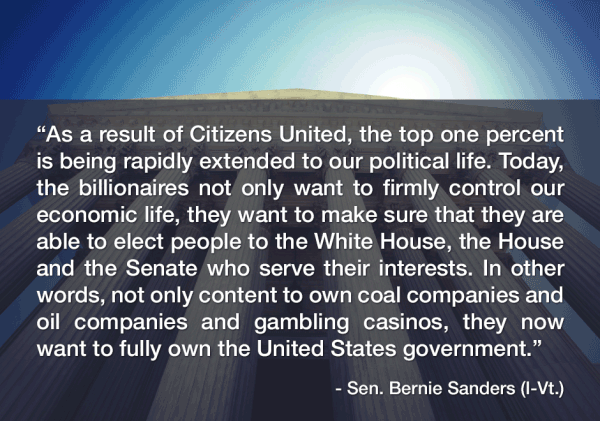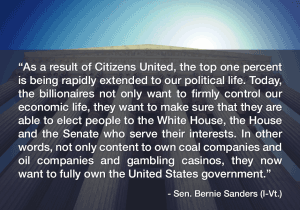- Like
- Digg
- Del
- Tumblr
- VKontakte
- Buffer
- Love This
- Odnoklassniki
- Meneame
- Blogger
- Amazon
- Yahoo Mail
- Gmail
- AOL
- Newsvine
- HackerNews
- Evernote
- MySpace
- Mail.ru
- Viadeo
- Line
- Comments
- Yummly
- SMS
- Viber
- Telegram
- Subscribe
- Skype
- Facebook Messenger
- Kakao
- LiveJournal
- Yammer
- Edgar
- Fintel
- Mix
- Instapaper
- Copy Link

Another disappointing ruling came down from the the U.S. Supreme Court under Chief Justice Roberts lastweek, in which Big Money scored a major victory against average citizens. In McCutcheon v. FEC, the court struck down contribution limits for what one individual can contribute to political campaigns and party committees during an election cycle.
The floodgates are now open for the captains of industry and heads of multi-national corporations to influence elections however they see fit with their wealth. Much was said of money as speech during the case, but what about the free speech of the average citizen, which is drowned out by all the industry money? The only trickle down of wealth to be had now is the trickle down of campaign cash to politicians, who are supposed to be representing their constituents and not just those with money.
The current limit had been $123,200 in aggregate, but now, according to this article, “one wealthy donor would be permitted to contribute more than $3.5 million to a single party’s candidates and party committees (plus a virtually unlimited amount to supportive PACs).”
Supreme Court Justice Stephen Breyer, in his dissent, stated, “Today’s decision eviscerates our Nation’s campaign finance laws, leaving a remnant incapable of dealing with the grave problems of democratic legitimacy that those laws were intended to resolves.”
After first the Citizens United decision, and now the McCutcheon decision, these campaign finance laws,enacted after the Watergate scandal to crack down on political corruption, are rapidly disappearing. Fred Wertheimer, from Democracy 21, stated that this decision “overturned 40 years of national policy and 38 years of judicial precedent.”
But, we can fight back! There are various bills floating around that deserve our attention, such as HR 270, the Empowering Citizens Act, which would “repair the presidential public financing system, create a similar financing system for congressional races, prevent individual candidate Super PACs and strengthen the rules prohibiting coordination between outside spending groups and candidates.”
There is also HR 148, the Disclose Act, which has been around for a while and would do much to shed light onthe who is giving to whom and fix loopholes in current campaign finance disclosure law.
The Government By the People Act (HR 20) and the Fair Elections Now Act (S 2023), similar House and bills, could give more influence to small donors instead of large corporate donors, so that fundraising is moredemocratic. This would encourage those who aren’t wealthy and connected to run for Congress, and give them a better chance at winning, allowing average folks a chance to help and be able to win, and be allowedset the agenda in Washington.
Most important, there is the movement for a constitutional amendment to fix all of this mess and overturn both the Citizens United and McCutcheon decisions by saying that limits were necessary to fight against special interests and big donors having too much influence on elections. If what we have to do is spell out that money
is not speech and that corporations are not people, then let’s buckle in for the fight to take back our democracy instead of handing it over to large industry and corporations.
I work on clean elections issues for OVEC, including getting better campaign finance disclosure laws for West Virginia and expanding public campaign finance. To get involved, contact me at dan@ohvec.org











